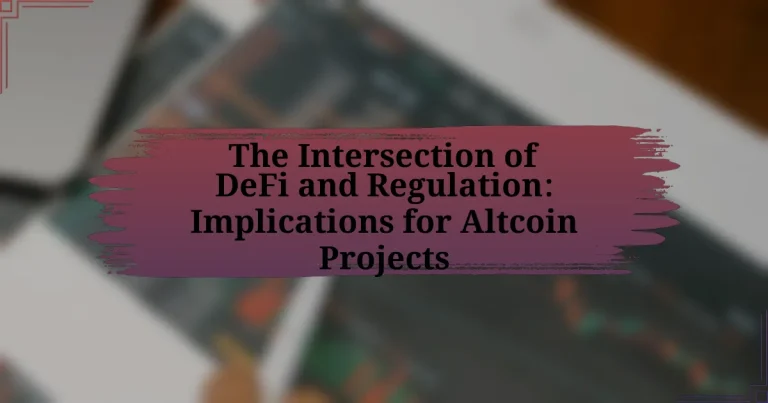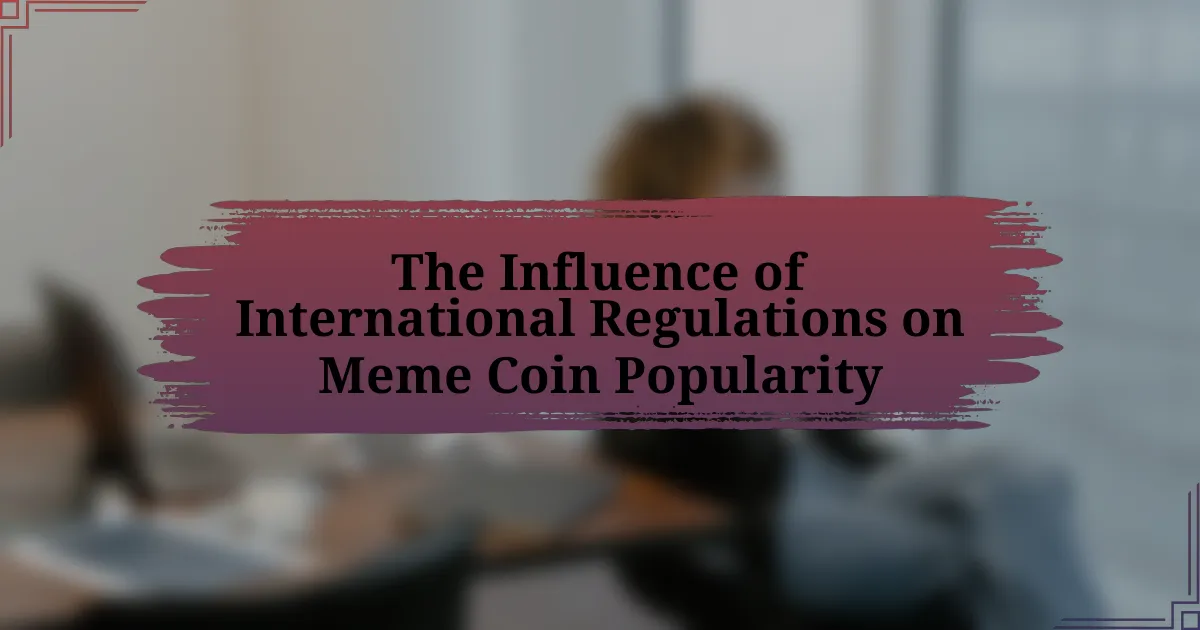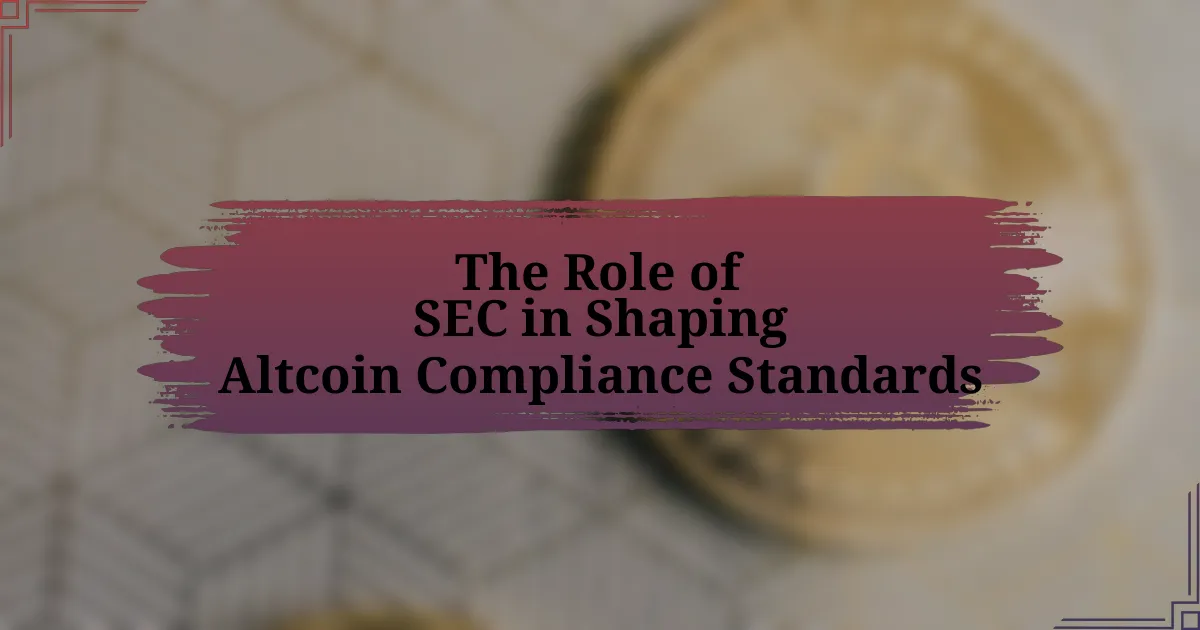The article examines the intersection of decentralized finance (DeFi) and regulatory frameworks, highlighting the implications for altcoin projects. It discusses how DeFi operates on blockchain technology, enabling peer-to-peer transactions without intermediaries, while regulatory bodies seek to ensure consumer protection and financial stability. Key topics include the challenges posed by DeFi’s principles of decentralization and transparency to traditional regulation, the evolving regulatory landscape, and the impact of compliance on altcoin project viability. The article also explores current regulatory trends, the role of various regulatory bodies, and strategies for altcoin projects to navigate these challenges while fostering innovation.
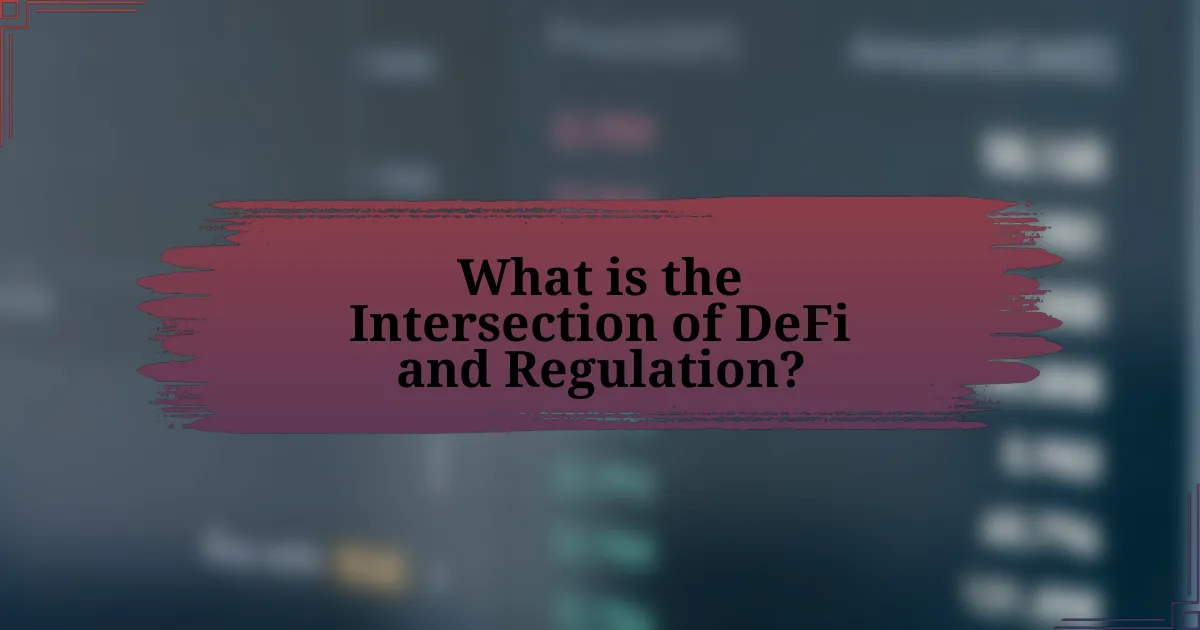
What is the Intersection of DeFi and Regulation?
The intersection of DeFi and regulation refers to the evolving relationship between decentralized finance platforms and regulatory frameworks established by governments. DeFi operates on blockchain technology, enabling peer-to-peer financial transactions without intermediaries, while regulation aims to ensure consumer protection, prevent fraud, and maintain financial stability. As DeFi grows, regulators are increasingly scrutinizing these platforms to address concerns such as money laundering, tax evasion, and investor protection. For instance, the Financial Action Task Force (FATF) has issued guidelines that require DeFi projects to comply with anti-money laundering (AML) and know-your-customer (KYC) regulations, highlighting the necessity for regulatory clarity in this rapidly developing sector.
How do DeFi and regulation interact in the current financial landscape?
DeFi and regulation interact in the current financial landscape through a complex relationship where decentralized finance platforms face increasing scrutiny from regulatory bodies. Regulatory authorities are concerned about issues such as consumer protection, anti-money laundering, and market integrity, leading to calls for clearer guidelines and compliance measures for DeFi projects. For instance, the Financial Action Task Force (FATF) has issued recommendations that require DeFi platforms to implement Know Your Customer (KYC) protocols, which challenges the foundational principle of decentralization. Additionally, the U.S. Securities and Exchange Commission (SEC) has taken action against certain DeFi projects, asserting that they may fall under existing securities laws, thereby pushing for regulatory clarity in the evolving landscape.
What are the key principles of DeFi that challenge traditional regulation?
The key principles of DeFi that challenge traditional regulation include decentralization, transparency, and programmability. Decentralization removes the need for intermediaries, making it difficult for regulators to enforce compliance, as there is no central authority to hold accountable. Transparency in DeFi protocols allows users to verify transactions and smart contracts, but it also complicates the identification of responsible parties for regulatory purposes. Programmability enables automated financial services through smart contracts, which can operate independently of regulatory oversight, further complicating traditional regulatory frameworks. These principles collectively create an environment that is inherently resistant to conventional regulatory approaches.
How does regulation aim to address the risks associated with DeFi?
Regulation aims to address the risks associated with DeFi by establishing frameworks that promote transparency, consumer protection, and financial stability. Regulatory bodies implement measures such as Know Your Customer (KYC) and Anti-Money Laundering (AML) requirements to mitigate risks of fraud and illicit activities. For instance, the Financial Action Task Force (FATF) has issued guidelines that encourage jurisdictions to regulate virtual asset service providers, ensuring they comply with these standards. Additionally, regulations may require DeFi platforms to disclose risks and provide clear information to users, thereby enhancing accountability and reducing the potential for market manipulation.
Why is the intersection of DeFi and regulation significant for altcoin projects?
The intersection of DeFi and regulation is significant for altcoin projects because it shapes their operational frameworks and market viability. Regulatory clarity can enhance investor confidence, leading to increased adoption and liquidity for altcoins. For instance, the implementation of regulations can help mitigate risks associated with fraud and market manipulation, which are prevalent in unregulated environments. Additionally, compliant altcoin projects may gain access to institutional investment, as many institutional investors require regulatory adherence before participating in the market. This dynamic illustrates how regulatory frameworks can directly influence the success and sustainability of altcoin projects in the evolving financial landscape.
What potential impacts do regulatory changes have on altcoin projects?
Regulatory changes can significantly impact altcoin projects by altering their operational frameworks and market viability. For instance, stricter regulations may lead to increased compliance costs, forcing projects to allocate resources towards legal and regulatory adherence rather than innovation. Additionally, regulatory clarity can enhance investor confidence, potentially increasing market participation and liquidity for compliant altcoins. Conversely, ambiguous regulations may create uncertainty, deterring investment and stifling growth. Historical examples include the SEC’s actions against certain ICOs, which resulted in project shutdowns and loss of investor funds, illustrating the direct consequences of regulatory scrutiny on altcoin viability.
How can altcoin projects adapt to evolving regulatory frameworks?
Altcoin projects can adapt to evolving regulatory frameworks by implementing compliance measures that align with local and international laws. This includes conducting thorough legal assessments to understand the regulatory landscape, engaging with legal experts to ensure adherence to securities laws, and incorporating KYC (Know Your Customer) and AML (Anti-Money Laundering) protocols. For instance, the Financial Action Task Force (FATF) guidelines require cryptocurrency exchanges to implement these measures, which altcoin projects can adopt to mitigate legal risks. Additionally, maintaining open communication with regulators can facilitate a better understanding of compliance requirements and foster a collaborative relationship, as seen in jurisdictions like Switzerland, where regulatory clarity has encouraged innovation in the crypto space.
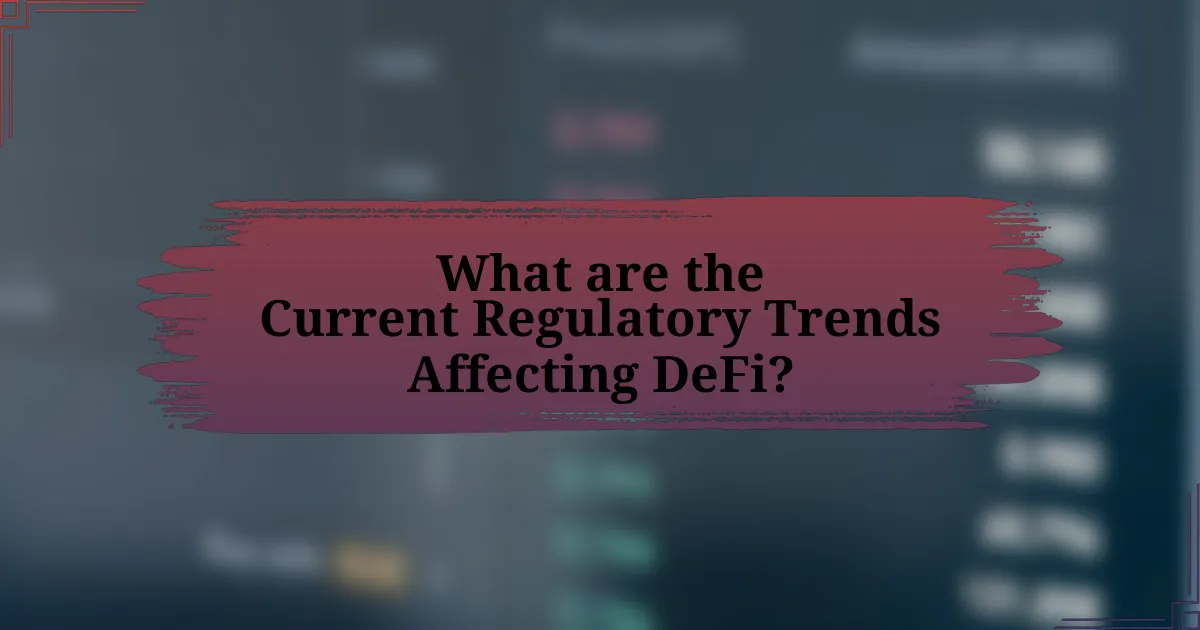
What are the Current Regulatory Trends Affecting DeFi?
Current regulatory trends affecting DeFi include increased scrutiny from governments and regulatory bodies aimed at ensuring compliance with anti-money laundering (AML) and know-your-customer (KYC) regulations. For instance, the Financial Action Task Force (FATF) has issued guidelines that require DeFi platforms to implement KYC measures similar to traditional financial institutions. Additionally, the U.S. Securities and Exchange Commission (SEC) has been actively pursuing enforcement actions against DeFi projects that it deems to be offering unregistered securities, highlighting the need for regulatory clarity in token classifications. These trends indicate a shift towards more stringent oversight, as regulators seek to mitigate risks associated with fraud, market manipulation, and consumer protection in the rapidly evolving DeFi landscape.
What regulatory bodies are involved in overseeing DeFi?
Regulatory bodies involved in overseeing DeFi include the U.S. Securities and Exchange Commission (SEC), the Commodity Futures Trading Commission (CFTC), and the Financial Action Task Force (FATF). The SEC regulates securities and has indicated that many DeFi tokens may qualify as securities under U.S. law, thus falling under its jurisdiction. The CFTC oversees derivatives markets and has asserted authority over certain DeFi activities related to commodities. The FATF provides international guidelines to combat money laundering and terrorist financing, which impact DeFi protocols globally. These organizations collectively shape the regulatory landscape for decentralized finance, influencing compliance and operational frameworks for DeFi projects.
How do different countries approach DeFi regulation?
Different countries approach DeFi regulation with varying degrees of strictness and frameworks. For instance, the United States employs a fragmented regulatory approach, where agencies like the SEC and CFTC oversee different aspects of DeFi, often classifying tokens as securities or commodities based on their characteristics. In contrast, countries like Switzerland have adopted a more favorable stance, implementing a clear regulatory framework that encourages innovation while ensuring consumer protection. Additionally, nations such as China have taken a stringent approach by banning cryptocurrency transactions altogether, reflecting a zero-tolerance policy towards decentralized finance. These diverse regulatory landscapes illustrate how national priorities and economic strategies shape the governance of DeFi, impacting its development and adoption globally.
What are the implications of these regulatory approaches for global DeFi projects?
Regulatory approaches significantly impact global DeFi projects by imposing compliance requirements that can hinder innovation and operational flexibility. For instance, regulations may necessitate that DeFi platforms implement Know Your Customer (KYC) and Anti-Money Laundering (AML) protocols, which could deter users who value privacy and decentralization. Additionally, regulatory scrutiny can lead to increased operational costs and potential legal liabilities, forcing projects to allocate resources towards compliance rather than development. The European Union’s Markets in Crypto-Assets (MiCA) regulation exemplifies this trend, as it aims to create a unified regulatory framework that could standardize practices across member states, potentially stifling the unique characteristics of various DeFi projects. Overall, while regulation can enhance consumer protection and market integrity, it also poses challenges that may limit the growth and diversity of global DeFi initiatives.
What are the challenges faced by altcoin projects in a regulated environment?
Altcoin projects face significant challenges in a regulated environment, primarily due to compliance with varying regulatory frameworks. These projects must navigate complex legal requirements, which can include registration, reporting, and adherence to anti-money laundering (AML) and know your customer (KYC) regulations. For instance, the Financial Action Task Force (FATF) has set guidelines that require cryptocurrency exchanges to implement stringent KYC processes, impacting how altcoins are traded and adopted. Additionally, regulatory uncertainty can hinder investment and innovation, as projects may struggle to secure funding or partnerships without clear legal guidelines. The evolving nature of regulations, such as the SEC’s stance on classifying certain altcoins as securities, further complicates the operational landscape for these projects, leading to potential legal repercussions and market volatility.
How do compliance requirements impact the development of altcoin projects?
Compliance requirements significantly influence the development of altcoin projects by necessitating adherence to legal and regulatory standards, which can shape project design and operational strategies. For instance, projects must often implement Know Your Customer (KYC) and Anti-Money Laundering (AML) protocols to avoid legal repercussions, which can increase development costs and extend timelines. Additionally, regulatory scrutiny can lead to changes in tokenomics, as projects may need to adjust their token distribution models to comply with securities laws, impacting investor appeal and market dynamics. The necessity for compliance can also limit innovation, as developers may prioritize regulatory alignment over experimental features, ultimately affecting the competitive landscape of altcoins.
What strategies can altcoin projects employ to navigate regulatory hurdles?
Altcoin projects can navigate regulatory hurdles by implementing compliance frameworks that align with existing laws and regulations. These frameworks often include conducting thorough legal assessments to classify their tokens accurately, ensuring adherence to anti-money laundering (AML) and know your customer (KYC) regulations, and engaging with regulators proactively to foster transparency. For instance, projects like Ripple have worked closely with regulatory bodies to clarify their status and obligations, which has helped them mitigate legal risks. Additionally, establishing robust governance structures and maintaining open communication with stakeholders can further enhance compliance and adaptability to changing regulatory landscapes.
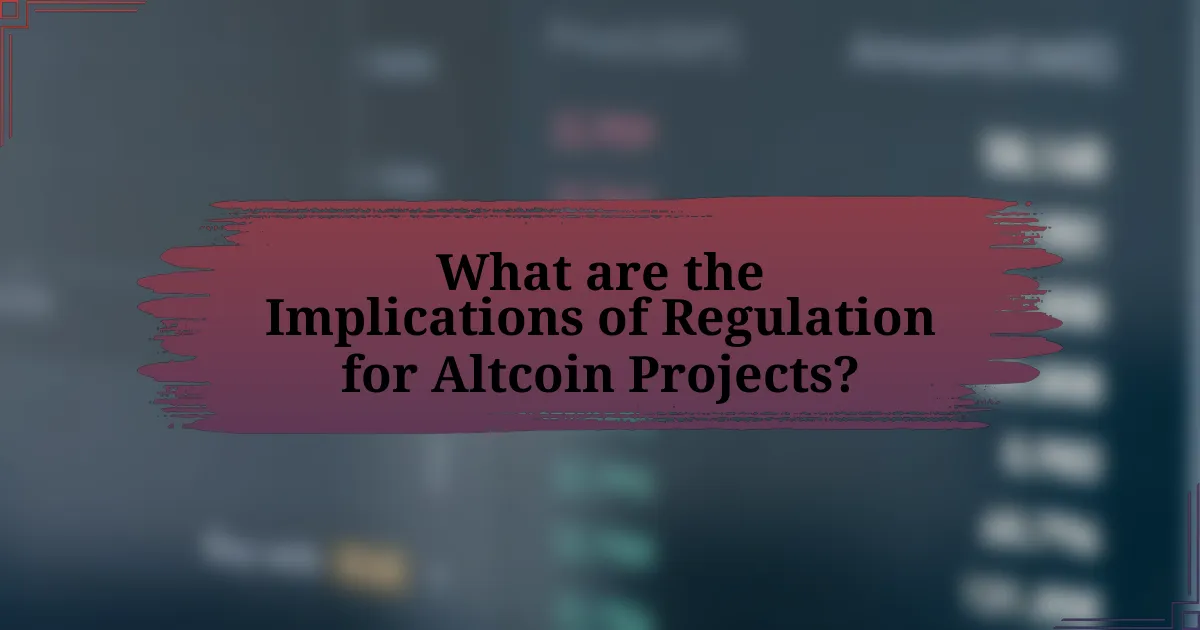
What are the Implications of Regulation for Altcoin Projects?
Regulation significantly impacts altcoin projects by imposing compliance requirements that can affect their operational viability and market access. Regulatory frameworks often necessitate that altcoin projects adhere to specific legal standards, such as anti-money laundering (AML) and know your customer (KYC) protocols, which can increase operational costs and complexity. For instance, the U.S. Securities and Exchange Commission (SEC) has classified certain altcoins as securities, requiring them to register and comply with securities laws, which can limit their ability to raise funds and attract investors. Additionally, regulatory scrutiny can lead to increased market volatility, as projects that fail to comply may face penalties or be delisted from exchanges, impacting their liquidity and user trust.
How does regulation influence investor confidence in altcoin projects?
Regulation significantly enhances investor confidence in altcoin projects by providing a framework that ensures transparency, accountability, and legal protection. When regulatory bodies establish clear guidelines, investors perceive a reduced risk of fraud and market manipulation, which is crucial in the often-volatile cryptocurrency market. For instance, the implementation of the European Union’s Markets in Crypto-Assets (MiCA) regulation aims to create a safer environment for investors by setting standards for crypto asset service providers, thereby fostering trust. Additionally, studies have shown that regulatory clarity can lead to increased institutional investment in cryptocurrencies, as seen in the aftermath of the U.S. Securities and Exchange Commission’s (SEC) clearer stance on certain altcoins, which resulted in a surge in market participation.
What role does transparency play in building trust among investors?
Transparency is crucial in building trust among investors as it fosters an environment of openness and accountability. When companies provide clear and accessible information regarding their operations, financial health, and decision-making processes, investors feel more secure in their investments. Research indicates that organizations with high transparency levels often experience increased investor confidence and engagement, leading to higher investment levels. For instance, a study by the CFA Institute found that 78% of investors consider transparency a key factor in their investment decisions, highlighting its significant role in establishing trust.
How can altcoin projects leverage regulatory compliance to attract investment?
Altcoin projects can leverage regulatory compliance to attract investment by demonstrating adherence to legal frameworks, which reduces risk for investors. Compliance with regulations such as the Securities and Exchange Commission (SEC) guidelines in the United States can enhance credibility and foster trust among potential investors. For instance, projects that register their tokens as securities and provide transparent disclosures are more likely to appeal to institutional investors who prioritize regulatory assurance. Additionally, compliance can facilitate partnerships with traditional financial institutions, further broadening access to capital. According to a report by PwC, 77% of crypto executives believe that regulatory clarity will drive institutional investment, highlighting the importance of compliance in attracting funding.
What best practices should altcoin projects adopt in light of regulatory scrutiny?
Altcoin projects should adopt transparency, compliance with local regulations, and robust security measures in light of regulatory scrutiny. Transparency involves clear communication about project goals, token utility, and financial practices, which helps build trust with regulators and users. Compliance with local regulations requires projects to understand and adhere to laws governing securities, anti-money laundering, and consumer protection, as seen in jurisdictions like the United States, where the SEC has taken action against non-compliant projects. Robust security measures, including regular audits and secure coding practices, protect user assets and enhance credibility, as evidenced by the increasing number of hacks in the crypto space, which have led to significant financial losses.
How can altcoin projects ensure they remain compliant while innovating?
Altcoin projects can ensure compliance while innovating by implementing robust legal frameworks and engaging with regulatory bodies. By proactively consulting with legal experts and regulators, these projects can navigate the complex landscape of financial regulations, such as the Securities and Exchange Commission guidelines in the United States, which classify certain tokens as securities. Additionally, conducting regular audits and adhering to anti-money laundering (AML) and know your customer (KYC) regulations can further solidify compliance. For instance, projects that have successfully integrated compliance measures, like Chainalysis, demonstrate that maintaining transparency and accountability can coexist with innovation in the decentralized finance (DeFi) space.
What resources are available for altcoin projects to stay informed about regulatory changes?
Altcoin projects can utilize several resources to stay informed about regulatory changes, including legal advisory firms specializing in cryptocurrency, industry associations like the Blockchain Association, and regulatory news platforms such as CoinDesk and The Block. Legal advisory firms provide tailored guidance on compliance and regulatory updates, while industry associations advocate for favorable regulations and offer insights into legislative developments. Regulatory news platforms aggregate news and analysis on regulatory changes, helping projects stay updated on the evolving landscape. These resources collectively ensure that altcoin projects remain informed and compliant with relevant regulations.
What are the future prospects for DeFi and regulation in relation to altcoin projects?
The future prospects for DeFi and regulation in relation to altcoin projects indicate a trend towards increased regulatory scrutiny and compliance requirements. As decentralized finance continues to grow, regulators are likely to implement frameworks aimed at protecting investors and ensuring market integrity. For instance, the Financial Action Task Force (FATF) has already recommended that countries enforce anti-money laundering (AML) and know-your-customer (KYC) regulations on DeFi platforms, which could significantly impact how altcoin projects operate. Additionally, the U.S. Securities and Exchange Commission (SEC) has been actively pursuing enforcement actions against projects deemed to be offering unregistered securities, suggesting that altcoin projects may face stricter regulatory oversight in the future. This evolving regulatory landscape will likely compel altcoin projects to adapt their business models to comply with new laws, potentially leading to greater legitimacy and stability in the DeFi space.
How might regulatory frameworks evolve to accommodate DeFi innovations?
Regulatory frameworks may evolve to accommodate DeFi innovations by adopting a more flexible and adaptive approach that recognizes the unique characteristics of decentralized finance. This evolution could involve the establishment of specific guidelines that differentiate DeFi protocols from traditional financial institutions, allowing for innovation while ensuring consumer protection and financial stability. For instance, jurisdictions like the European Union are already exploring regulatory sandboxes that enable DeFi projects to operate under a controlled environment, facilitating compliance while fostering innovation. Such frameworks could also incorporate principles of self-regulation, where DeFi platforms implement governance mechanisms that align with regulatory expectations, thereby reducing the burden on regulators to create exhaustive rules.
What opportunities could arise for altcoin projects in a regulated DeFi landscape?
In a regulated DeFi landscape, altcoin projects could benefit from increased legitimacy and access to institutional investors. Regulatory frameworks can provide clarity and security, encouraging traditional financial institutions to engage with DeFi, which historically has been viewed as risky. For instance, the implementation of regulations can lead to the establishment of compliant platforms that facilitate the trading and use of altcoins, thereby expanding their market reach. Additionally, regulatory compliance can enhance user trust, potentially increasing adoption rates among retail investors. This shift can be evidenced by the growing interest in compliant DeFi solutions, as seen in the rise of projects that prioritize regulatory adherence, such as Aave and Compound, which have begun to explore partnerships with regulated entities.

